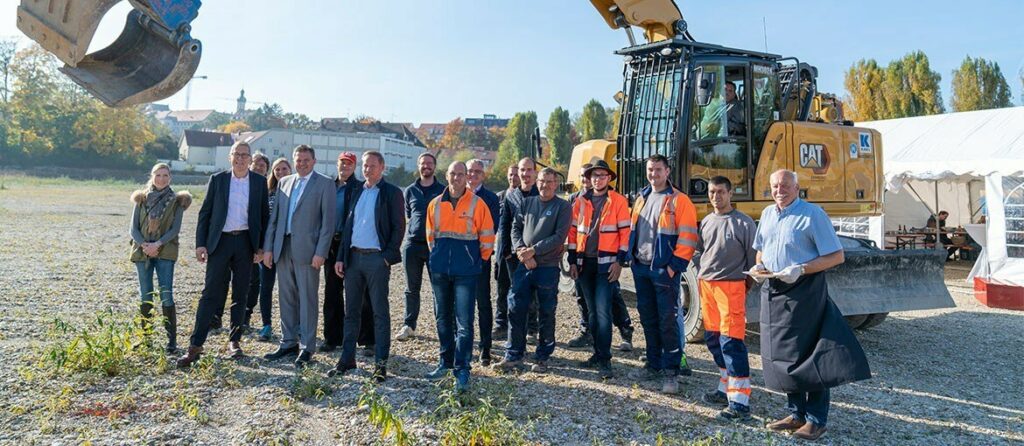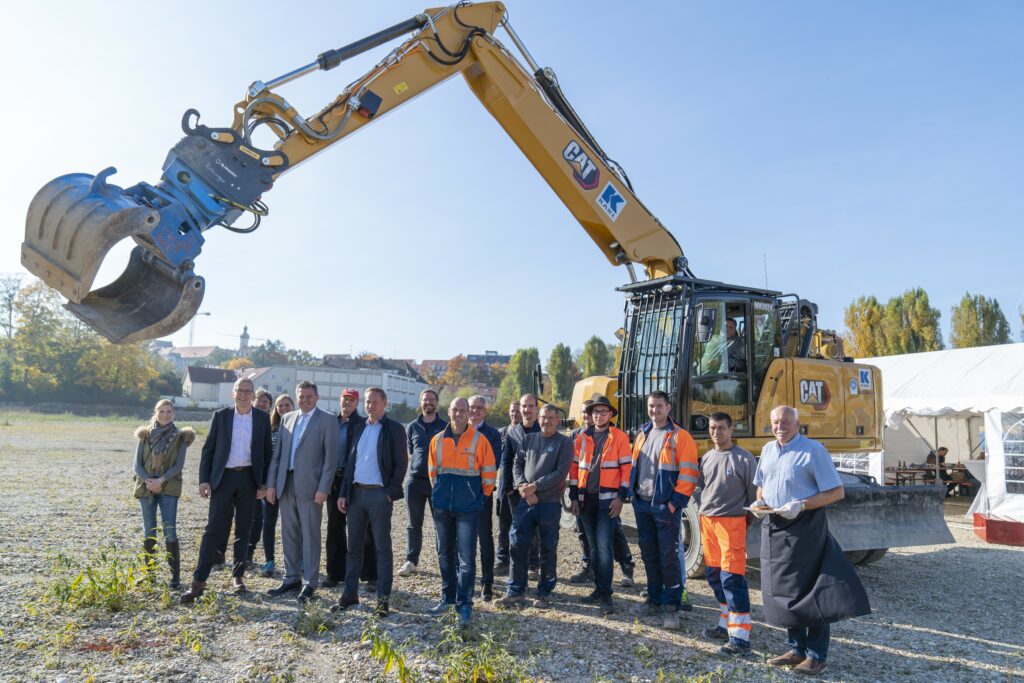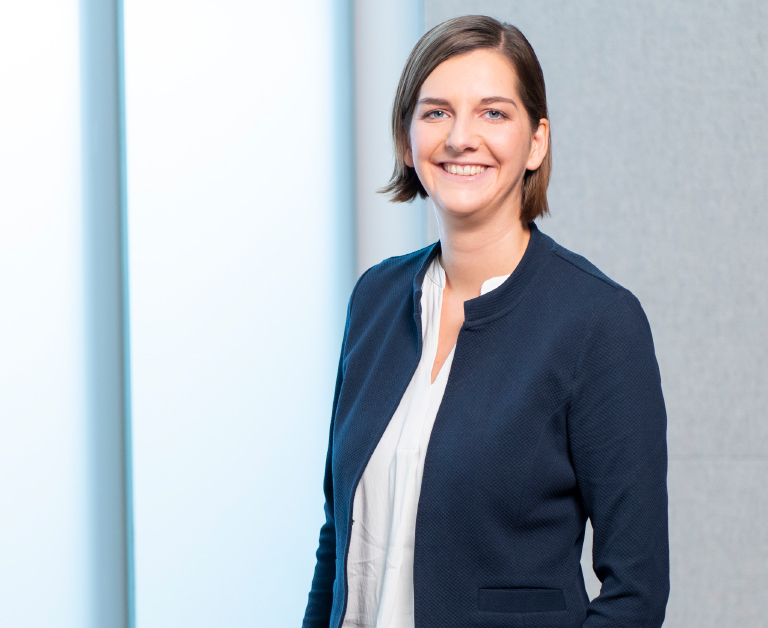With this stage of works completed, Isaria and Deutsche Wohnen thank the firms, project engineers and workers involved.
Munich, October 27, 2021. On Wednesday 27/10/2021, 40 guests were invited to celebrate the completion of demolition works on the MD Papierfabrik site. The festivities, organized by project development firm Isaria and site owner Deutsche Wohnen, took place at the former lumberyard on Ostenstrasse, Dachau. The hosts laid on beer and snacks between 2.00 and 5.00 p.m. as they thanked the project engineers, firms and workers who planned and implemented the challenging demolition scheme. The deputy District Administrator for the Dachau district, Helmut Zech, and Isaria Managing Director, David Christmann, honored the achievements of the firms involved.
After paper production ceased at the MD Papierfabrik site, the premises long remained one of the largest demolition and building disposal sites in Bavaria. To prepare for the former industrial site to be developed into an urban neighborhood, 40 factory buildings needed to be torn down and the resulting rubble sorted, processed and disposed of. The demolition phase was planned and managed by Campus engineers in collaboration with project managers Andreas Hanke, Christian Kafka and Pierre Manthe. The work has been ongoing since 2018 and was completed by the Karl Group under the supervision of Jan Mara and foreman Christian Karwarth. Gudrun Piesczek was responsible for the technical management of the works on behalf of Isaria. Project manager Michael Gerstner and his deputy Anika Schmider took on overall responsibility for the implementation of the project.
Authorized representative and Chartered Engineer Michael Gerstner has been involved in supporting the project development in Dachau from the outset, and has planned and coordinated all upcoming processes. He is looking forward to the next tasks to be implemented on the project site: “The completion of demolition works on the site marks a major and important milestone. Now soil decontamination will continue until 2023, of course, and the millstream superstructure still needs to be demolished so that we can rehabilitate the riverbed; but the bulk of the work has now been done. As soon as a legally binding development plan is available, we can start implementing the plans from the winning tender, submitted by Trojan + Trojan. Then the people of Dachau will finally get a piece of their city back.”
David Christmann emphasizes the sustainable nature of the future neighborhood: “For the new Mühlbach district, the focus is on social, environmental and economic sustainability. We want to create good neighborhoods with high-quality architecture, naturalistic recreational amenities and an economy that can also generate these qualities and secure them for the long term. The revitalization of the Mühlbach area presents an opportunity to address environmental challenges such as the cooling of urban areas, the irrigation of trees and how best to shape the Mühlbach and Amper waterways.”
Works on the site
The site, which is being redeveloped in its entirety, encompasses approximately 14 hectares. The area consists of the central premises, the Mayer terraces to the north and the lumberyard to the south. Around 40 buildings with cellars and a volume of 704,561 m3 have been demolished on the former industrial site. Approximately 70-75% of the demolition material was reprocessed and broken down for use as recycled concrete. This reclaimed material was reused on other building sites. During the works, approximately 600,000 tonnes of earth was moved and recycled, while just 20% of the soil had to be disposed of in landfill.
There were 16 groundwater wells created for the permanent cleaning of the groundwater on the site. The quality of the groundwater is constantly monitored by means of 25 sampling points along the groundwater outflow.
Water was of key importance when MD Papierfabrik was operational, and will return as a tangible sensory component of the future Mühlbach district. Where the millstream once ran under the factory site and was used to generate electricity, in future it will be brought to the surface and become a space for nature and a place to experience nature. Diversion of the millstream into a temporary riverbed is planned for spring 2022 – this is a complex undertaking that will be necessary in order to dismantle the superstructure over the waterway and decontaminate the soil under the river. From now until 2023 works at the site will focus mainly on soil decontamination, following which development work can commence, and then construction of the buildings. However, this is dependent on having a legally binding development plan in place, which must be prepared by Dachau City Council as part of an urban development process.
About Isaria München Projektentwicklungs GmbH and Deutsche Wohnen
Isaria specializes in the development of sustainable buildings and city districts in urban areas. From the time of acquisition through to the construction phase, all projects undergo sustainability analyses as a matter of routine. The goal when doing this is always to develop livable urban districts while conserving resources, for example on the MD paper mill site in Dachau, where up to 1,000 apartments are to be built in the coming years. Isaria is part of Quarterback Immobilien AG.
Deutsche Wohnen is one of the leading listed real-estate companies in Europe. The company’s operational focus is on managing and doing business with its portfolio of residential real estate in dynamic metropolitan areas and conurbations in Germany. Deutsche Wohnen sees itself as having a social responsibility and an obligation to maintain livable and affordable housing in vibrant neighborhoods and to develop new housing of the same quality.
About the demolition and refurbishment so far
The machines have moved over 600,000 metric tons of earth during their work on the MD site. This volume is equivalent to 60,000 elephants. The focus of the work is now primarily on rehabilitating the earth in addition to the demolition. Extensive processing and treatment is necessary in order to turn the former industrial site into a livable town district. Approximately 20 percent of the soil mass is being processed and reused on-site. This will involve different materials such as concrete, steel, and iron being cleanly separated from each other, some of them being pulverized, and all put into different categories. The processed earth will be used as a source of subsoil and humus as well as recycled concrete which can then be used on other building sites.
Of the material that is not reused on the MD site, 80 percent is returned into the cycle of sustainable materials management in road construction or gravel plants.



